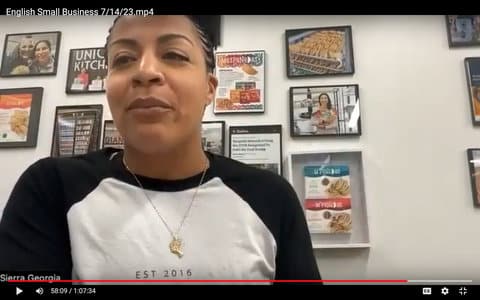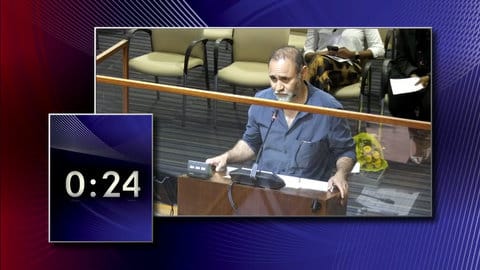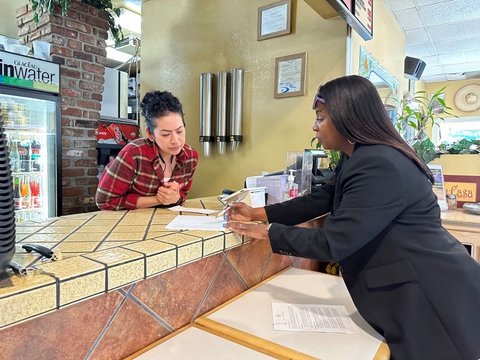
12 Aug Small Business Owners Need a Lift Up, Not a Handout

Small business owner Sierra Georgia shared her story during a July 14 Ethnic Media Services news briefing. (Screenshot captured by Danielle Parenteau-Decker / The CC Pulse)
By Danielle Parenteau-Decker
Sierra Georgia’s family had two businesses when she was growing up, but both had shut down by the time she graduated from college. So she went to work for the government before deciding to make a change and start her own business.
Georgia spoke on a panel hosted July 14 by Ethnic Media Services for a national news briefing titled “Growing Main Street America, One Small Business at a Time.”
After graduating from Howard University with a degree in international business, she was hired by the Federal Aviation Administration — her first job not for her family. They had a moving and storage transportation company with multiple locations and the Atlantic City Waterfront Club, which she said helped prepared her to found her own company.
“Everything was always family-owned and -operated, so I had a front row seat of what that looked like,” Georgia said.
In 2013, she resigned from the FAA to sell gelato in Washington, D.C. But first, she needed to find the money to do so.
“I had trouble getting funding for a while,” she said. “It was not easy.”
Georgia said she was denied 11 times before being approved by one community development financial institution. A CDFI is a bank, credit union, loan fund, microloan fund or venture capital provider that provides financial products and services to economically disadvantaged communities.
That CDFI only gave her half of what she had asked for.
“But that was enough,” she said. “I said, ‘Well, this is what I got. I got to make it work.’ ”
At first, she bought and sold gelato made by another company, but that soon became too expensive. So she made another change.
Georgia went to Italy to learn how to make gelato, ultimately graduating from Carpigiani Gelato University in Bologna. Yes, a school dedicated to gelato. Georgia said there is a whole gelato culture in Italy.
She was in the minority three times over among her classmates.
“I was the only brown person at school the whole time,” she said, adding that she was also the only American and one of three women in a class of about 20.
With her education, she became an artisan gelato master.
Small business owners like Georgia face many challenges — even more so when they are minorities and/or women.
To start a business, Charles Phillips, founder of the Black Economic Alliance, said people need capital, networks and basic training and support. Of course, not everyone has access to those things, which can set them up for failure.
“It’s hard to start a business. There’s lots you have to know … understanding a P&L (profit and loss) statement and regulations, how to benchmark yourself, managing people, sourcing talent,” he said. “If you make those decisions wrong upfront, it’s very hard to recover sometimes.”
Georgia also addressed the kind of support entrepreneurs need.
“A lot of small business owners, we’re the hardest working people in America,” she said. “We’re not necessarily looking for a handout. We’re looking for a lift up.”
>>>Read: Small Businesses Are Still Fighting to Survive the Pandemic
Shernaz Daver of Kholas Ventures shared some things female entrepreneurs told her have been said to them over the past year while conducting business, including being asked when they would have children. One said she was not taken seriously while fundraising because she was a woman on her own. Things changed when she brought in a male partner.
“I was told I was too aggressive in my financial projections,” another woman told Daver. “Yet when my male partner presented it, he was seen as confident.”
These comments were all recent, but they’re nothing new.
“I’ve been in the industry for over 35 years, and I heard the same thing 35 years ago,” Daver said. “If you’re Black or Hispanic, it gets worse.”
She talked about what could help improve things for women in business.
For one, girls and young women need to be taught how to advocate for themselves. Beyond that, there needs to be more female venture capitalists.
“Once you have a woman in a position of power, influence and decision-making economically, it changes the tide for lots of women,” Daver said.
When women are successful in business that needs to be recognized more, but they shouldn’t always have to succeed.
“We need to give women the permission to fail. We do not do that as a society,” she said. There are “very few companies in the world that start with a product, nail it, and become a big company with that.”
She continued, “Give us the ability to experiment and to fail, and if Sen. Warner can fail three times being a white male — I do not know a single woman today that can say that, and we need to change that.”
Daver was referring to Sen. Mark Warner, D-Virginia, who earlier in the discussion said he “failed miserably the first two times” he tried to start a business. “Third time, I did OK.” (Better than OK: As recently as 2018, he had a net worth of over $214 million, according to OpenSecrets, an independent group that tracks money in politics.)
>>>Read: Lawmaker, Human Rights Advocates Debate TikTok Ban Legislation
“If I’d come out with ($50,000) or $60,000 the way young people do now, I would have never taken a chance as an entrepreneur,” Warner said. “I also realize if I’d not been a white guy with appropriate education, I wouldn’t have gotten three shots.”
Warner graduated from George Washington University and Harvard Law School and said he thinks he might not have even gotten his first shot if he had not attended a school like Harvard.
His debt came up when a reporter asked about student debt preventing young people from becoming homeowners.
Owning a home or business are major ways people can build wealth and have something to pass on to their families, but as the saying goes, typically, you need money to make money.





No Comments